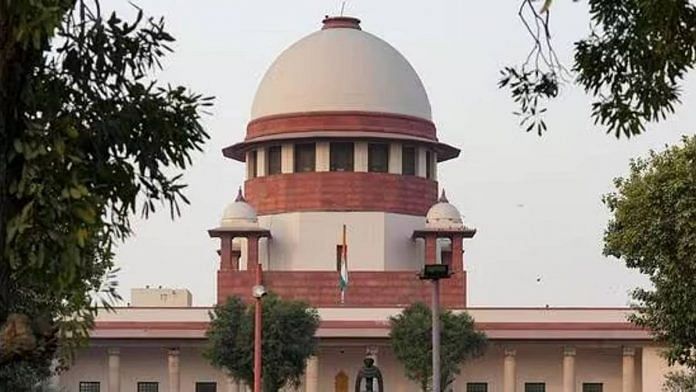New Delhi: The Supreme Court Tuesday invalidated two extensions given to the present chief of the Enforcement Directorate (ED), Sanjay Mishra, holding that they were against its September 2021 direction to the central government.
Restraining the government from granting Mishra further extensions, a three-judge bench led by Justice B.R. Gavai, however, permitted him to continue as director, ED, till 31 July to enable the government to find a replacement. “Fifteen days is a sufficient time for you to appoint a new director,” the bench, also comprising justices Vikram Nath and Sanjay Karol, told solicitor general Tushar Mehta after the pronouncement.
In its verdict, delivered on a bunch of petitions questioning Mishra’s extension, the bench further ruled that though the legislature can take away the basis of a judgement, it cannot annul a mandamus. Two extensions to Mishra — the first granted in November 2021 and the second in November 2022 — were against the mandamus issued to the government in the top court’s judgement delivered in September 2021, the bench said.
The mandamus was given on a petition filed by non-profit Common Cause, questioning Mishra’s first extension in November 2020, after the end of his two-year term as director of the Enforcement Directorate.
A mandamus is a judicial writ issued to a lower court or order issued to a party, asking it to perform a statutory duty.
The bench, however, upheld amendments to the Delhi Special Police Establishment Act, 1946 and the Central Vigilance Commission Act, 2003. The modified laws allow the central government to extend the tenure of directors of both the ED and the Central Bureau of Investigation (CBI) by one year at a time till the completion of five years from the initial appointment. On the strength of these changes, the government had extended Mishra’s tenure twice, once in November 2021 and then again in November 2022.
With regard to the amendments, the bench tested their legality on the touchstone of the three-tier principle underlined in its earlier judgements. The top court said its power to review a legislation is very limited and concluded that the said amendments do not affect the fundamental rights of citizens.
Also, the amendments do not manifest any arbitrariness as extension of service can be granted to high-ranking officials in public interest, the court observed. It noted that the law requires the high-level committee, recommending the extensions, to record its reasons in writing.
Mishra’s continuation as the ED director has been embroiled in litigation ever since he was given the first extension in November 2020, two years after he was appointed as the chief of the anti-money laundering agency. To facilitate his extension, the government retrospectively revised his appointment order in 2020, increasing his tenure from two to three years.
This move was questioned by Common Cause and some more petitioners in the Supreme Court. Though the bench, then led by Justice L.N. Rao (now retired) and Justice Gavai, had affirmed the move to extend Mishra’s tenure, the apex court had cautioned against granting him further extensions.
To overcome the specific direction vis-à-vis Mishra, the government in November 2021, three days before Mishra was about to retire, introduced two ordinances amending the Delhi Special Police Establishment Act, 1946 and the Central Vigilance Commission Act, 2003, which culminated into bills after Parliament approved them.
On the basis of this amendment, the government extended Mishra’s term in November 2021 and then again in November last year.
The amendments and extension to Mishra were questioned before SC through eight separate PILs. Petitioners included Congress leaders Jaya Thakur and Randeep Singh Surjewala, TMC MP Mahua Moitra and the party’s national spokesperson Saket Gokhale.
The government defended the move to introduce changes in the existing law and described the petitions as motivated and filed to further ‘oblique political interests’. It was argued that the petitions were filed to ensure that the ED does not discharge its duties fearlessly.
In February this year, senior advocate K.V. Vishwanathan, now a judge of the Supreme Court, was asked to assist the court. As an amicus curiae (friend of the court), the senior counsel gave a critical opinion over the extension as well as modifications made in the law, calling them ‘illegal’. The bench had reserved its verdict on the petitions in May this year.
The judgement discussed in detail the appointment mechanism for the appointment of the two directors and observed the same was evolved following the Vineet Narain judgement in which the top court had emphasised on the need to insulate probe agencies.
These appointments, the apex court said Tuesday, are cleared by a high-powered committee consisting of members described by the court.
The petitioners’ concern about government control over the appointments were brushed aside, with the court observing: “It is, thus, clear that it is not at the sweet-will of the Government that the extensions can be granted to the incumbents in the office of the Director of CBI/director of Enforcement.
“It is only on the basis of the recommendations of the committees which are constituted to recommend their appointment and that too when it is found in public interest and when the reasons are recorded in writing, such an extension can be granted by the Government.”
And, if the committees can be trusted with regard to the respective recommendations on initial appointments of ED and CBI directors, then, the court saw no reason as to why their suggestion on extension cannot be trusted.
Moreover, these recommendations would cite reasons in support of the decision.
This is an updated version of the report
(Edited by Amrtansh Arora)
Also Read: Big courtroom that can fit ’13-judge bench’, waiting area for litigants — SC makeover in works



